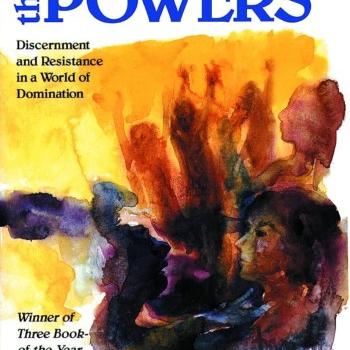In comments to the post below, Mark brings up this particular scripture passage as one of his favorites:
For even when we were with you, we gave you this rule: "If a man will not work, he shall not eat." (2 Thessalonians 3:10)
Mark suggests that this verse seems to him to rule out "welfare." I'm not sure why. Mark doesn't say, specifically, what he means by "welfare." Clearly he's not referring to assistance programs like unemployment insurance, since to be eligible for such assistance one must be willing to work.
So let's assume he's referring to the program most commonly meant by the umbrella term "welfare" — TANF (temporary aid to needy families), which replaced AFDC (aid to families with dependent children).
The recipients of these programs are single mothers and their children — the people whom the Bible refers to as "widows and orphans." The vast body of biblical teaching on widows and orphans — which commands both the king and the people to provide for their support — might seem to contradict Paul's rule in 2 Thess. 3:10. But keep in mind that Christian teaching has always held that the raising of children is work. Widows were not regarded as the "idle … busybodies" that Paul condemns in the next verse. They were regarded as people with a very important and difficult job that didn't pay very well, i.e. the care of their children. (See, for a recent example of this teaching, section 19 of John Paul 2's rich encyclical "On Human Work.)
It's worth noting that some of the staunchest opponents of gender neutral English translations of the Bible insist on reading this passage as gender neutral. Their translations (as the NIV above) have Paul saying "If a man …" yet they freely read this as "If a single mother …"
Here's the gender-neutral NRSV:
For even when we were with you we gave you this command: Anyone unwilling to work should not eat.
This passage entails a clear responsibility to work. With that responsibility comes the corresponding right to work. This is why unemployment — the idling of those willing, indeed desperate, to work — has long been regarded by Christian social teaching as among the most grievous economic injustices. (In Laborem exercens, mentioned above, John Paul 2 refers to the "scourge of unemployment" and says that it is "in all cases an evil.")
This connection between rights and responsibilities is an important aspect of Christian teaching, but the implications of this are often overlooked in America. Here we like to embrace the responsibility — clubbing the poor over the head with 2 Thess. 3:10 — while denying the right.
St. Paul's rule for the Thessalonians is often cited as though it were an argument for welfare repeal. It's not. It's an argument for full employment.
















